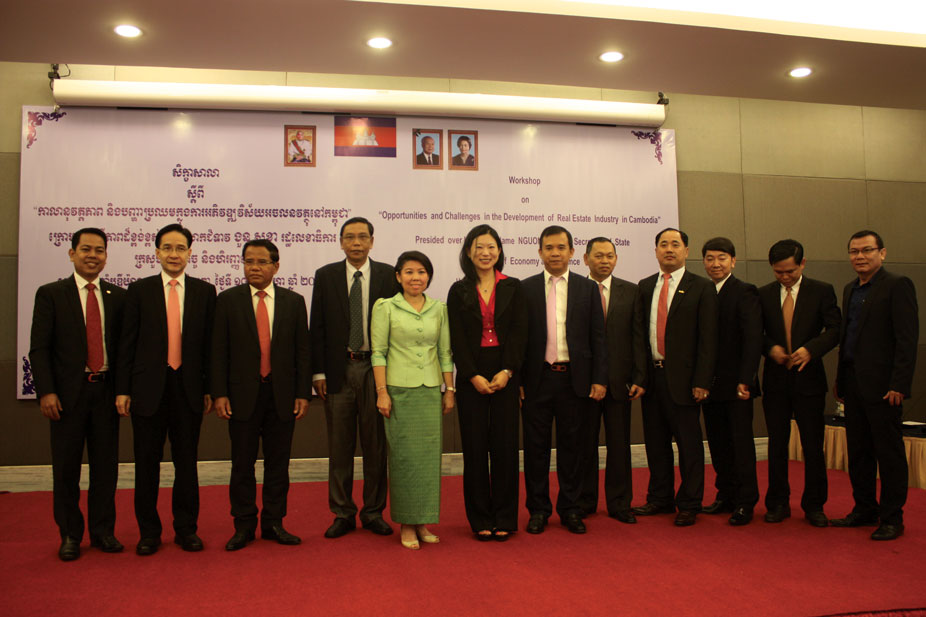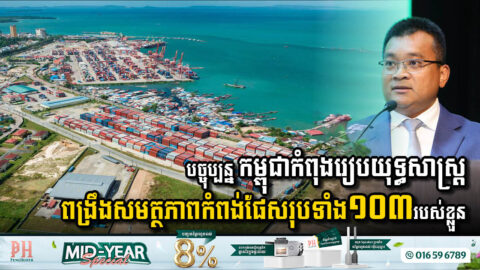Amid Prosperity, Challenges Remain
It is generally accepted that the real estate market in Cambodia is progressivley growing in a steady manner. However, public regulators and private sector industry insiders are also warning of existing and future setbacks.
At a recent ‘Workshop on Opportunities and Challenges in the Development of the Real Estate Industry in Cambodia on 18 August, representatives from the Ministry of Land Management, Urban Planning and Construction, Ministry of Economy and Finance, National Bank of Cambodia (NBC), Association of Banks of Cambodia (ABC), Cambodia Valuers and Estate Agents (CVEA) Association gathered to discuss risks and solutions. Real estate agencies and developers agreed that the sector is moving healthily now after they have learnt how the crisis broke out in the 2008-2009 global economic crisis .
Besides referring to the lack of property-related data for analysis, they also noted some challenges arising from construction, finance and property industries. These could hamper the emerging property market since these sectors are inter-connected.
H.E. Ngoun Sokha, Secretary of State, Ministry of Economy and Finance affirmed the government doesn’t foresee any warning signs in the industry for the immediate future, but asserted that identifying future risks is compulsory to ensure stability.
“Real estate is a main propeller for the country’s socio-economic growth, but it also the main source of risks to the economy and society as well,” she said. “So, we need to ensure this industry can be developed sustainably by identifying and preventing the risks in advance.”
She confessed the ministry hasn’t been able to monitor this industry firmly to identify the exact risks yet so far due to the lack of accurate information and data. This has inspired her team to set up effective statistical and information systems to analyse the industry. She warned both buyers and developers to clearly understand the demand-supply concept.
According to ministry data, H.E. Mey Van, Director of the Financial Industry Department reported that as of the first semester 2015, the ministry had licensed 62 residential developers (47 local and 15 international-based firms) and 94 residential development projects (77 local-based projects and 17 overseas-based) with a total investment cost of over $1.2 billion.
It has also licensed 116 real estate companies (76 local firms and 40 international firms) with 125 registered realty agents and 70 appraisal agents.
The regulator which is still young to the sector doesn’t yet have the mechanisms to assess their investment value, so depends on developers themselves to declare their investment cost, stressed Mey.
H.E. Kim Rada, Director of NBC’s Supervision Department worried about a number of financial concerns relevant to real estate loans: the high and volatile growth of real estate loans; high Non-Performance Loan (NPL) in the real estate sector of 0.25 per cent off the total 2.66 per cent of NPL, illegal shadow banking where developers act as financial agenices by providing loans to buyers; the lack of long-term funding sources for banks to finance of up to 20 years; careless lending conditions offered by financial institutions; price overvaluation and speculation for property appraisals to get loans; and the data unavailability for analysis.
According to NBC data, as of June 2015, loans provided to the real estate-related sector reached over $2 billion, or about 19 per cent (4 percent for residential loans, 8 percent for construction loans and 4 percent for property-related activities) of the total banks’ loans. “This 19 percent of loan allocation hasn’t reach an alarming point yet,” he stressed.
NBC carefully monitors property loans to ensure the stability of the financial and real estate markets. It exemplified intervention when the sector is likely to face risks when property loans increase too high compared to other loans, such as in 2011 (166.9 per cent or $737 million) and 2014 (145.5 percent or $1,757 million). This meant banks needed to deposit almost 100% of their capital to the central bank to assure those loans they provided to clients. The central bank immediately increased the reserve requirements so that banks needed to reduce their lending to borrowers as well. As a result, property loans went down to a stable amount.
Noting that the NBC applies both micro and macro solutions to secure the finance-to-real estate sector, Kim advised a balance between real estate developments and financial stability, enhancing effective loan policies, improving transparency on data distribution about property values, investment scales and unofficial finance, enhancing property appraisal professions, and reducing the gap between demand and supply.
1581 design and construction firm registered for licensing from 2000 through to mid-2015 but only 646 firms are holding valid licenses, including 202 foreign-originated firms.
Charles Vann, ABC Treasurer and also Acting Chairman of the Cambodia Constructors Association (CCA) is worried about the high interest rates of 7-9 percent in Cambodia’s banking sector compared to 2-3 per cent in other ASEAN countries. He is also concerned about citizens’ limited knowledge on the financial sector, while there is tight competition in this small market.
H.E. Huy Nara, Director General of Construction Department, Ministry of Land Management, Urban Planning and Construction admitted that the government hasn’t been able so far to firmly control property prices, letting developers set prices freely. Many people, including construction professionals and property owners, are without insurance coverage.
“For the case of an architect that earns a few thousand dollars per month to design a condominium, how can he or she payback for the defects in the building because of his or her errors in the plans?”, he asked.
While he warned buyers not to buy properties that haven’t received a construction permit from the ministry, he also warned developers themselves to be careful while building their projects especially in relation to safety, structural works and location.
Sorn Seap, CVEA Acting Chairman stressed the need to enhance real estate professionalism for Cambodian agents, improve property data collection, ensure transparent competition among agencies and set up standardised property advertisements. He also requested the government to speed up the property ownership transfer process as it will benefit both real estate businesses and the make it eassier for the government to collect property tax.
- Video Advertisement -



 ខ្មែរ
ខ្មែរ







